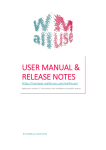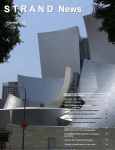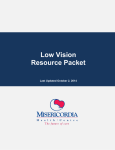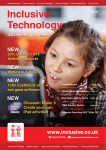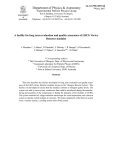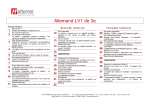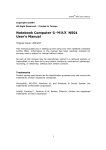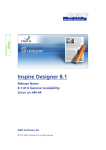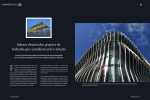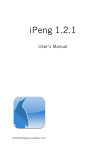Download Further Learning A4:Further Learning A4
Transcript
Further Learning Opportunities Key Stage 3 2011 - 2012 www.georgemitchellschool.co.uk Each year group will work through the following over the year, extending the work done on these topics in the class. YEAR 7 1. 2. 3. 4. 5. 6. 7. 8. 9. 10. 11. 12. 13. 14. 15. 16. 17. 18. Properties of numbers Sequences and patterns Whole numbers and decimals Area and perimeter Fractions and percentages Grouped data and simple statistics Angles Probability Decimals and measures Equations and formulae Handling data Fractions and graphs Transformations Percentages, ratio and proportion Properties of shapes Constructions Using algebra Solving number problems Mathematics homework YEAR 8 1. 2. 3. 4. 5. 6. 7. 8. 9. 10. 11. 12. 13. 14. 15. 16. Properties of numbers Angles and shapes Linear sequences Whole numbers, decimals and fractions Probability Expressions and formulae Measures Fractions, decimals and percentages Handling data Functions and graphs Proportional reasoning Transformations Equations and formulae Constructions Using algebra Solving problems YEAR 9 1. 2. 3. 4. 5. 6. 7. 8. 9. 10. 11. 12. 13. 14. Number and number operations Angles Fractions and decimals Directed numbers Decimals Algebra Perimeter and area of 2D shapes Sequences Graphs Measure Percentages Power and roots Three-dimensional shapes Estimating and accuracy www.georgemitchellschool.co.uk 3 4 Science further learning opportunities Year 7 www.georgemitchellschool.co.uk Year 8 Year 9 Half Term 1 Half Term 2 Half Term 3 Half Term 4 Half Term 5 3D animal cell: use items at home to produce a model that represents the main features of an animal cell Solar System model: use any waste material to present a mini model of our solar system including the 9 known planets and the Sun Indicator at home: use red cabbage as an indicator to decide whether chemicals at home are acids or alkalis Design an animal: make a model or poster of an animal that can survive in any of the four major habitats: desert, forest, arctic, ocean Design a plane: make a model or poster of your own plane and show how your design reduces friction forces Rainbows: Find out what makes a red top rainbow form and what causes it blue top rainbow reflection Element Poster: pick a number between 1100, find the element that corresponds in the periodic table to display information about its characteristics use www.webelements.com Name the bones: Find out how many bones there are in a human body and try to find the names of as many as possible Morse Code: Find the full morse code to write your own first name and last name in code Atom Model: Make a model or poster to show the main parts that make up an atom, include the charge found on each part Make a battery: make a poster to show how to make a household lemon battery or build you own lemon battery (this can be tested in school) Famous Family tree: Pick your favourite celebrity, try to find as much information about their family as possible, include at least parents, sisters and children Eggboat: Use instructions from the youtube eggboat video to build a simple candle powered boat bring into school for testing. Picture periodic table: Find pictures to build your own periodic table, you may not use any element names, only photographs that show each element Healthy Menu: design a meal menu for one day that will satisfy the nutritional needs of a 12 yr old student based on your own gender Fitness programme: Design a simple exercise programme that will help someone start or improve their fitness Electric readings at home: Check all home appliances at home for a voltage, current and power reading; list them in order of highest to lowest Half Term 6 Fuels at home: use the labels on chemicals at home to determine whether they are fuels or not (use the fire triangle) Year 7 1. Investigate and report ● ● ● What is technology and how is it used in our everyday lives? Choose 1 technology and explain how it makes a difference to your life. How would life be without it? (Word or PowerPoint) 2. Social Networking websites: These have become very popular, especially with school children. ● ● ● ● Do you have a social networking page? What are they used for? Are these a good idea? What things do you need to be careful about when using these websites? (Word or PowerPoint) 3. “Back to the future?” You wake up one morning and find yourself in 2050. Everything has changed! Write a short story about how technology might have changed and how it has affected how people live. It‟s the future, so you can write about technology that doesn‟t even exist! (Word or PowerPoint) 4. Create a Blog about something that interests you! ICT further learning opportunities – For more info go to www.blogger.co.uk (there are others available on the internet that you can use – remember to give your ICT teacher the link) Year 8 1. “Computers and Robots are taking over the world” – In your own way, explain what you think this means (500 words minimum) 2. My use of the internet Create a PowerPoint presentation explaining your use of computers and the internet in a day. ● ● ● ● ● How often do you use it? What do you use it for? How much time do you spend on it each day? What would/do you do if your internet connection at home was to go? Extension: Conduct a survey (you may want to use Excel to make things easier) to figure out how other people you know use the internet. 3. A Phone for the future The mobile phone market has transformed in the past 10 years. We now use our mobile phones to take pictures, surf the internet, update our social networking pages and occasionally, make phone calls. How will mobile phones change in the future? Imagine you are a mobile phone designer in 2020, draw a detailed sketch of a phone that will exist in 2020. What features will it have? Remember, these features don‟t have to exist yet (it‟s the future!) Will it still be the same shape as phones today? What else could you do with the phone that you cannot currently do? Will it be able to cook your food?! ● Remember, it‟s your phone; you can design it as you like. ● Extension: Write a user manual for your phone ● ● ● 4. Create a Blog about something that interests you! – For more info go to www.blogger.co.uk (there are others available on the internet that you can use – remember to give your ICT teacher the link) www.georgemitchellschool.co.uk 5 Year 9 1. “Social networking websites” ● ● ● ● ● What are they? Why are they used? What is being said about them in the media? Some argue that they are a „social ill‟; what do you think this means? Extension: Many argue that social networking sites have actually reduced human social interaction – what do you think this means? 2. Computers and the Law and Media Recently there have been many occurances of computer misuse on the internet and about how people have broken the law with “cyber crime”. This includes hacking; transmission of computer viruses; Copyright; Peer to peer downloading (The Pirate Bay; LimeWire, PSPGames, Kazaa, Bit Torrent) etc. ● ● ● ● ● Research a story/incident in the news that has discussed cyber crime How has the law/government reacted to this? What does cybercrime mean to the everyday user (me and you)? What things should be done to prevent cybercrime? What penalties should be imposed on people who commit cybercrime? Is it right to send them to prison? 3. The iPod Generation The iPod has taken the world by storm. With the release of the iPad, computing and the way we interact with technology is changing. ICT further learning opportunities ● 6 Where do you think the world is heading with personal technologies like the iPod/iPad? How will these technologies impact our lives? ● Have we as human beings become too reliant on technology? ● Should there be age restrictions on who can/cannot use certain technologies? ● Extension: Write a report about the features of 4. Create a Blog about something that interests you! – For more info go to www.blogger.co.uk (there are others available on the internet that you can use – remember to give your ICT teacher the link) www.georgemitchellschool.co.uk At KS3 Year 7 Autumn 1st term Topic- rights FLO- to finish off your rights card saying what right from the UN Convention of the rights of the child you think is very important. Topic- young people and the law FLO- do a table in your book. On one side put the reasons why laws matter to you, on the other put the reasons why they don‟t. 2nd term Topic- child poverty FLO- write a paragraph about what poverty is and what wealth is in your books, give an example of a country which is wealthy and a country which is poor. Citizenship and RE further learning opportunities Topic- what are these countries like? Research three countries that have child labour FLO- research the three countries you have been learning about in lessons and prepare a poster and PowerPoint on them so you can present this back to the class. Spring 1st term Topic- what are the lives of children who work like? How does child labour deny children‟s rights? FLO- create a poem/song/piece of creative writing to express how you feel child labour denies children their rights. Topic- how can I make a difference? (to child labour) FLO- to complete an active citizenship task to try to raise awareness about child labour, using the plans you have made during lessons. Write a paragraph about what you did in your books. Summer 1st term Topic- the 10 commandments FLO- Complete your list of 10 rules for the classroom (make sure they include one personal responsibility, a collective responsibility and a moral responsibility). Topic- the story of Moses FLO- Complete you comic book strip on the life of Moses using what you have learnt in lessons to help you. 2nd term Topic-young people and the law FLO- using the law you have chosen as most important in your lessons complete 5-10 bullet points on why you think that that law is most important, now use these to write a speech which you will be delivering to class where a vote will be taken on which law is seen as most important. Year 8 Autumn 1st term Topic- what does it mean to be British? FLO- to write your own poem/ national anthem showing what being British means to you. Topic- identity: who am I? Who are you? FLO- to complete an identity poster/ booklet showing what makes up your identity based on the thought shower we completed in class. Topic- The Commonwealth FLO- to bring in photos of someone you know that lives in a commonwealth country. To interview them using the 10 questions we created in class to find out about the country they come from. Spring 1st term Topic- the role of an MP FLO- to complete your model of an MP, showing what you think are the important qualities an MP must have, who represents you. Topic- the European Union FLO- to complete a new flag for the EU representing what you think its function is. www.georgemitchellschool.co.uk 7 2nd term Topic- the role of elections FLO- to complete a poster about why you think it is important to vote. Topic- creating your own manifesto FLO- to complete your own manifesto in preparation for our mock election. Summer 1st term Topic- religious discrimination FLO- imagine you are someone who has been persecuted because of your religion, write a short story/poem about how you might feel. Topic- prayer FLO- complete your own prayer (this does not have to be written to God. It can be what you wish for in life if you are not religious). Topic: religious festivals FLO- complete your display and PowerPoint on the festival you have chosen to research this term. Citizenship and RE further learning opportunities Year 9 Autumn 1st term Topic- the media FLO- look in the papers this week for a story that you think uses context or bias. Write a short piece about how you think the media uses context and bias to shape peoples‟ opinions about things, using the story you have found as an example. Topic- advertising FLO- finish off planning and making the props and writing the script for your advert. Ensure you use one of the advertising sales techniques we have been investigating this term, so that we can film it ready to be peer assessed. 2nd term Topic- soap operas and the representation of young people FLO- to complete the questions based on the soap opera you have created. Give a brief description of the most current storylines and characters involved and a full description of the youngest characters. Why are these characters a good/bad example of young people? If you could how would you change the story lines? Topic- gun crime FLO- write about why you think people join gangs or carry weapons ready for a discussion the class will have. Spring 1st term Topic- gun crime FLO- using your campaign booklet plan, carry out and reflect on an active citizenship task to stop gangs, gun and knife crime in Waltham Forest. Topic- special occasions FLO- to investigate another religious ceremony other than marriage and plan a lesson to teach others about what is involved and why it is significant. Topic: believing in God FLO- to list some of the reasons why you think people believe in God and outline in your own words the cosmological, ontological, morality, experience and teleological arguments. Summer 1st term Topic- what happens after you die? FLO- write a paragraph about what you think happens after you die and what the evidence is for this. Draw a picture to go with what you are writing. Topic- terrorism FLO- research the terrorist organisation you have chosen fromm the ones we have been learning about this term and prepare a lesson on it to teach to other students in the class. Topic- refugees FLO- write you own piece of creative writing, imagining you are a refugee child using what you have learnt about refugees and asylum seekers in lessons. 8 www.georgemitchellschool.co.uk All History FLOs are on the blogs which are regularly updated. Students can have a go at the most current FLOs or explore the blogs and try others. These usually take the form of investigations which can be recorded either online (through the comments), offline as word processed documents/presentations or in handwritten form. There are also links to games and interesting websites. Students in every year group will find creative and challenging activities on the blogs. There is a blog for each year group: www.gmhistory7.blogspot.com www.gmhistory8.blogspot.com www.gmhistory9.blogspot.com To look forward: History further learning opportunities www.gmhistory10.blogspot.com www.gmhistory11.blogspot.com www.georgemitchellschool.co.uk 9 Year 7 September-December ● Design a poster warning people of the dangers of earthquakes and what people should do to prepare for a disaster. ● Write a newspaper account or a report on one famous volcanic eruption. Explain what happened, why it happened and how the eruption affected people and property. ● For international week create a brochure about the chosen country. This should contain as much detail about the geography and people of the country as possible. ● Design and make a model of a volcano. Year 8 June- October ● Create a presentation titled: From source to mouth, the journey of a river. Choosing one famous river in the world create a visual journey on the river showing how the river affects the lives of the people who live near it. ● Create a flood prevention leaflet to warn people of the dangers of flooding and what to do to prepare for a flood. ● Design a poster that explains, with the aid of a diagram, one natural feature of a river. This could be a waterfall or river meander for example. Year 9 June- October Geography further learning opportunities ● Create a presentation on how the population of the world has changed over time. Explain how the present population is growing, what it will probably reach and how that growth might affect different countries. ● Design a report that explains the reasons why people migrate from one country to another. Try to explain why some places are more popular than others. ● Research the impact immigrants have on the place where they migrate to. Explain both the positive and negative effects both on the migrants as well as the community of which they become a part. Year 7 January- March ● Write a weather diary for a whole week making sure you collect information on temperature, rainfall, wind and sunshine. ● Choose a natural disaster caused by weather and write either a TV or newspaper report on what happened and how it affected people and their communities. ● Choose a place in the world with a different climate to the UK‟s. Create a presentation explaining what that climate is like and how it affects people as well as the plants and animals. Year 8 November -February ● Create a presentation about different levels of development in the world. Explain what the differences are between different countries and try to explain why those differences exist. ● Write a report explaining what the “credit crunch” is, how it happened and how it has affected people‟s lives. ● For international week create a brochure about the chosen country. This should contain as much detail about the geography and people of the country as possible. ● Design a poster or leaflet to raise awareness of the fight against global poverty. What can people do to help other less fortunate people in countries all over the world? Year 9 November -February ● Design the transport of the future. What will it look like and how will it improve people‟s lives. Try to explain what the advantages of your type of transport are and explain the problems caused by transport today. ● Write an essay titled: “How towns and cities are trying to solve the problem of Traffic congestion.” ● For international week create a brochure about the chosen country. This should contain as much detail about the geography and people of the country as possible. ● Design a tourist brochure about a country or place of your choice. 10 www.georgemitchellschool.co.uk Year 7 April-July ● Research a geographical case study/issue. N.B. A different issue each year. Year 8 March-May ● Create a presentation on the causes and effects of deforestation in Amazonia ● Research sustainable sources of energy and create a presentation that explains the benefits and problems of your chosen energy type. ● Create a leaflet that highlights the problem of drilling for oil in sensitive environments such as Amazonia ● Choose one example of a natural disaster (other than volcano or earthquake) and explain how people deal with the effects of the disaster. Explain what the short and long term effects of the disaster were for different places. Year 9 March-May Geography further learning opportunities ● Research the causes of climate change in the world today. Write an essay, compile a report or make a short DVD report on what the causes are and how people might be able to help prevent climate change from happening. ● Design a booklet that looks at the issue of deforestation of the Amazon rainforest. Try to explain what is happening, the reasons why it is happening and what the long term consequences might be. ● Design a short assembly to teach students about the culture and lives of the indigenous tribes of Amazonia. The assembly should try to celebrate the different cultures of the tribes as well as highlighting some of the potential dangers these tribes face from the modern world. www.georgemitchellschool.co.uk 1 1 Year 7 FLO Tasks - French Timing Tasks Term 1 1st half term 1 Task: „Carte d‟Identité‟ – Create your own Identity Card (Level 2) Term 1 2nd half term 2 Task: „Portrait de ma star préférée‟ – Prepare a presentation about a celebrity of your choice (Level 4) Term 2 1st half term 3 Task: „L‟uniforme de mes rêves‟ – Design and label your dream school uniform (Level 4) Term 2 2nd half term 4 Task: „La météo‟ – Prepare and present a weather forecast for the class (using the IWB or Powerpoint) (Level 4) Term 3 1st half term 5 Task: „Ma maison idéale‟ – Design your ideal house and describe it in French. OR „Clip de ma chambre‟ – Make a short film showing us your bedroom with a short commentary(or Podcast) (Level 4) Term 3 2nd half term 6 Task: „Village Olympique‟ – Create a plan for the Olympic village in Stratford 2012. Label in French (Level 4) Year 8 FLO Tasks - French French and Urdu further learning opportunities Timing Tasks Term 1 1st half term 1 Task: „Lettre de (name of student)‟ _ Reply to Françoise using a letter‟s format and introduce yourself including likes and dislikes (Level 4) Term 1 2nd half term 2 Task: „Une journée avec (name of student)‟_ Prepare a presentation about an ordinary day in your life using a comic‟s format including daily routine activities (Level 4) Term 2 1st half term 3 Task: „Mon Mii‟_ Create a character for the Wii game console including a full physical and personality description (Level 4) Term 2 2nd half term 4 Task: „Menu du restaurant (name of restaurant)‟ – Create your own menu including a creative design as example shown to students (Level 3) Term 3 1st half term 5 Task: „Le journal de (name of student)‟ – Create a diary relating your past holidays including activities and past tense using a comic format (Level 5) Term 3 2nd half term 6 Task: „www.aubergedejeuness.com‟ – Create a webpage promoting a youth hostel in France using a webpage format (Level 5) Year 9 FLO Tasks – French (Métro 4) Timing Term 1 1st half term (Module1) Term 1 2nd half term (Module2) Term 2 1st half term (Module 4) Term 2 1st half term (module 5) Term 2 2nd half term (module 6) Term 3 1st half term (module 8) Tasks 1 Task: „Le collège de mes rêves‟. Create a leaflet about the college of your dreams (Level 4) 2 Task: „Mon robot‟. You live in 2050 and you have a robot at home to help with the domestic tasks. Describe what the robot could do for you. And could it be a friend as well? (Level 5) 3 Task: You want to convince your friends to go on a one day trip to Calais in France. Write an E-mail outlining a plan for the day‟s programme (Level 5) 4 Task: „Ma ville/ mon village‟ _ Describe the place where you live (place it on a map and give geographical details) - (Level 4) 5 Task: „Vente de produits‟ –Create a dialogue between a shop assistant and a customer who looks for different sorts of products, in which one tries to convince the other to buy products in their shop (Level 5) 6 Task: „La vie en France‟_ You are doing a gap year in France. Reply to your penfriend‟s letter by telling them about your life in France and your opinions (Level 5) Year 9 FLO Tasks – Urdu Timing 12 Tasks Term 1 1st half term 1 Task: „The alphabet‟- Write the missing letters and also rearrange the letters. Joining 2 letter words (Level 1) Term 1 2nd half term 2 Task: „Colour me‟- Colour the picture given and label the colours in Urdu and English, write the colours you like and dislike (Level 1) Term 2 1st half term 3 Task: „About me‟- Give your personal description to a pen friend. Write about the family member you like the most (Level 4) Term 2 1st half term 4 Task:‟ Come to my house‟- Prepare a presentation about your home, describing different rooms and their contents in Urdu and English (Level 4) Term 2 2nd half term 5 Task: „A normal day in my life‟ -Telling times in words and numbers. Describing the activities you do at the weekend (Level 4) Term 3 1st half term 6 Task: „My school: George Mitchell school‟ - Write an email to your friend, telling her/him about your school, timetable and subjects you like /dislike (Level 4) www.georgemitchellschool.co.uk Year 7 Autumn Term Colour in a Room - Look at Van Gogh‟s painting called „Night Café‟ and Gauguin‟s „Night Café in Arles‟ Examine their use of colour and use what you see to produce your own image. Matisse - Look at Henri Matisse‟s collage called „Icarus‟. Look at how he used bold shapes to create his images and create your own collage. Spring Term Pop Art - Look at examples of Andy Warhol‟s portraits. Examine how he used bold, bright colours to create his images of celebrities and create your own version of a celebrity of your choice. Portrait of a journey - Type „David Hockney Nichols Canyon‟ into Google Images and look at the results. Examine his use of colour and composition and use what you see to produce your own image. Summer Term Hundertwasser‟s Urban Environment – Examine the work of Friedensreich Hundertwasser. Recreate your local environment in the style of his work. Fauvism - Examine work of the Fauvists. Produce a painting of your own, in their style. Year 8 Autumn Term Munch‟s Scream - Look at Munch‟s painting called „The Scream‟. Examine how colour can be used to change the emotional impact of an image. Produce an image of your own conveying an emotion. Art further learning opportunities Warhol - Look at Warhol‟s pictures called „Green Coca cola bottles‟ and „Campbells Tomato Soup‟. Think about how everyday objects can show how we live. Produce an image of an object of your choice in the style of Warhol. Spring Term Frida Kahlo - Look at Kahlo‟s self portrait „Broken Column‟ Think about how we can show events or situations using only pictures. Produce a portrait of yourself which also shows an important event in your life. Grayson Perry - Investigate the work of Grayson Perry. Examine how illustrations can be used both to tell a story and also as decoration. Design a pot and decorate it to tell a story of your choice. Summer Term Signs and Symbols – Examine different signs that you see in your local area. Design some signs of your own based on different activities which you see every day. Moving Images - Examine the work of Francis Bacon and Umberto Boccioni. Produce your own image showing movement. Year 9 Autumn Term Peter Blake‟s Sgt. Pepper - Look at Peter Blake‟s cover for The Beatles „Sgt. Pepper‟s Lonely Hearts Club Band‟ album. Produce a modern „pop‟ culture album cover using composite images. Picasso‟s Guernica - Examine Pablo Picasso‟s painting called „Guernica‟. Produce an image of your own in the same style that shows an historic event. Spring Term Francis Bacon - Examine Francis Bacon‟s self-portraits. Produce a self portrait in the same style that shows movement and multiple viewpoints. Family Traditions - Look up Do-Ho Suh‟s sculptures on Google Image. Examine his sculptures, especially the way the work is based around objects in his home. He uses local craftspeople to make them. Find out about a skill which a member of your family has. Create a collage, painting or drawing that is about or includes this skill. Summer Term Vincent Van Gogh – Look at the work of Van Gogh and examine his style. Produce an accurate copy of one of his pieces of work. That‟s The Way I See Things - Look at the work of artists such as Braque, Cezanne and Picasso. Create a still-life painting in their style. www.georgemitchellschool.co.uk 1 3 All tasks are detailed on tailored worksheets which will be given to you. The worksheets highlight the relevant key words and break the tasks into manageable sections. Term 1 Year 7: Sweeney Todd Learning Objective: To learn how to write a simple evaluation of a play based on Sweeney Todd. To learn how to draw and label a still image. Task: Draw and label a still image that has been completed over the term. Write a short review of one of the performances using some of the key words. Year 8: Status and Persuasion Learning Objective: To learn how to organise and rehearse a performance based on status. Task: With a partner organise a short performance to show to the class or teacher. The performance must be based on a high/low status relationship. Year 9: Too Much Punch for Judy Learning Objective: To learn about the role of a set designer. To learn how to design your own set. Task: Research the job role of a set designer and write a paragraph to describe the job. Draw and label a set design based on the play Too Much Punch for Judy. Term 2 Drama further learning opportunities Year 7: Commedia Dell Arte Learning Objective: You will learn some facts about a new Commedia Dell Arte character. Task: Research a new Commedia Dell Arte character (a character that you have not been practicing in Drama) Prepare a Powerpoint presentation based on this character. Show the presentation to the class and teach them how the character moves (optional). Year 8: Beowulf Learning Objective: You will learn some facts about the job of a costume designer. You will learn how to design a costume. Task: Research the job of a costume designer and write a paragraph to describe what they do. Draw and label a costume design for the character Beowulf. Year 9: Crime and Punishment Learning Objective: To learn how to write a monologue. Task: Use the internet to recap the function of a monologue and write one that describes Derek Bentley‟s feelings the night before he is due to be hanged. Term 3 Year 7: Greek Theatre Learning Objective: To learn about the shape and size of an ancient Greek amphitheatre. Task: Draw a picture of a Greek amphitheatre and label it. Year 8: Silent Movie Learning Objective: To learn how to use a storyboard and captions to illustrate ideas for a silent movie. Task: Draw a storyboard to illustrate ideas for a silent movie and write a caption to accompany each picture. Year 9: Hard To Swallow Learning Objective: To learn how to label a script with ideas for a performance. Task: Use the page from Hard to Swallow and label the script with ideas for body language, voice, movement, levels and facial expressions. 14 www.georgemitchellschool.co.uk YEAR 7 When: Sept - Oct Topic: Elements of Music Learning Objective: To understand the main elements of music. Task: Design a poster which includes all the elements of music When: Oct - Dec Topic: Song Structure Learning Objective: To become familiar with Tim Rice, a famous composer of theatre and film music. Task: Look at the song „A whole new world‟ from Aladdin and examine its structure and use this to compose your own song. Also, to learn the basics of Tim Rice the composer of „Aladdin‟. When: Dec – Feb Topic: Chinese Music Learning Objective: To become more familiar with basic Chinese instruments. Task: To produce an information booklet about Chinese Music to hand out to people in the street on Chinese New Year. When: Feb - April Topic: Notation Learning Objective: To be able to read the notes of the Treble Clef. Music further learning opportunities Task: Competition to see who can make the most words using the notes of the Treble Clef. When: April – May Topic: Rhythm Learning Objective: To further student‟s knowledge of rhythm. Task: Compose your own four bar rhythm (time signature is four CROTCHET beats in each bar). Year 8 When: Sept - Oct Topic: Reggae Learning Objective: To learn, by your own research more information about Bob Marley and other reggae artists. Task: To produce a book/project about Bob Marley and other famous Reggae artists When: Oct - Dec Topic: Protest Songs Learning Objective: To be aware of the importance of Protest songs in song/lyrics in song writing Task: To write a chorus and a verse of lyrics about something you feel strongly about. When: Jan - Feb Topic: Gamelan Learning Objective: To have more in-depth knowledge of Gamelan music Task: To give a spider diagram and an A4 information sheet to a Year 11 Music GCSE student, for revision before their exam. When: Feb - April Topic: Baroque Music Learning Objective: To become more familiar with Baroque music and Baroque composers, and to introduce adults to Coolio and the connections between them. Task: To make up a „Who Wants to be a Millionaire‟ style quiz about Baroque music. www.georgemitchellschool.co.uk 1 5 When: April - Easter Topic: Chord Progression Learning Objective: To be aware of the importance of basic Chords I, IV & V in all music. Task: To listen to Lean on Me by Bill Withers and list the order of chords throughout the song. Year 9 When: Sept - Oct Topic: Music and media Learning Objective: To become aware how famous John Williams is, especially with film music. Task: To produce a document or Powerpoint about John Williams. When: Oct - Dec Topic: Brit Pop Learning Objective: To be aware of the importance of Brit Pop to the music industry now. Task: To produce a detailed word document about the main bands of Brit Pop. When: Jan - Easter Topic: Expressive Arts – The 60‟s Learning Objective: To become aware of the importance of Bob Dylan‟s music in society. Music further learning opportunities Task: To annotate the lyrics of „Masters of War‟, then to continue to produce a Word Document about Bob Dlyan. 16 www.georgemitchellschool.co.uk Design technology further learning opportunities for years 7, 8 and 9 Textiles FLO In year 7 you do a lot of work, considering where fabrics come from. Produce a cartoon strip which would explain to a primary school child where their school jumper has come from. Consider every step of manufacturing, from raw material, to factory, to shop, to the child‟s wardrobe. Make sure you explain what impact each stage of production would have on the environment and onthe people working in the industry. Architecture FLO Do some research into one of the following three architects; Oscar Niemeyer, Alvaro Siza or Frank Gehry. Choose one of their buildings and produce a magazine article about that building. Include factual information about the building such as when it was built and how it was constructed. Also give your own opinion about the building explaining why you think it is important/interesting/beautiful. Finally try to think about what inspired the architect to produce the design. (You can research about these architects using the internet) Architecture FLO No 2 Imagine that there is going to be a new community centre in the borough of Waltham Forest and you have been asked by the council to choose an architect to design this building. Choose one of the following three architects, David Adaje, Antoni Gaudi or Norman Foster, and create an A4 document which explains why you think this architect should do the job. Make sure you include text and images. Make sure your graphics are clear. (You can research about these architects using the internet) Design FLO Visit the website, http://www.toxel.com and follow the link at the side to creative bus stops Have a look at the bus stops. Imagine if you had a swing to relax on as you were waiting. Imagine if the city had decided to develop brand new bus stops as they did in Curitiba, Brazil. Look at the designs on the page and then produce a design for Waltham Forest's Brand New Bus Stops. Make it fun, make it a place people would want to wait and make sure it is a positive addition to the urban landscape, something you would like looking at. Be imaginative! Sustainable Design FLO Do you know what your ecoFootprint is? Your ecoFootprint is measured in area. Using information about the way we eat, shop, travel and live we can calculate how much of the worlds resources we are using. We can then work out how many worlds we would need to keep us going if everyone lived like this. The WWF website has an ecoFootprint calculator http://footprint.wwf.org.uk/. Work out your own ecoFootprint and produce a piece of work where you answer the following questions; 1. What is YOUR own ecoFootprint? 2. What steps could you take to reduce your own ecoFootprint? 3. What could we do to reduce the school's ecoFootprint? If you want a design challenge you could also design a light for your home which would help you and your family to reduce their ecoFootprint. Think about lightbulbs, timers, switches and the look, of course. Food Technology FLO At GM school, we have an allotment and try to buy british whenever possible. Produce a poster or powerpoint presentation which encourages people to buy seasonal, British produce. Make the reader aware of why it is the right thing to do. Inclusive Design FLO The RNIB is a charity that works to help those who are blind. Imagine you have been asked to design a toy for blind/visually impaired children that will help them learn important skills. Produce a 3D design sketch of the toy you would make. www.georgemitchellschool.co.uk 1 7 In George Mitchell School we are very proud that we timetable Economic Awareness as a subject for Years 8 and 9. The opportunity to understand about the World of Work is key in preparation for your future lives. Year 8 Term 1 ● This will consist of extension to class work and reading up on key terms. Term 2 Business studies / economic awareness further learning opportunities ● 18 Enterprise Project – run your own business with a start up of £10. Term 3 ● Stock Market Challenge – a competition where students „buy‟ shares with an imaginary £100,000 ● Students track the prices of their chosen shares each week and the end of the competition, the portfolio with the highest value is declared the winner ● All year students will be working towards a External Qualification with opportunities to do various extension work Year 9 www.georgemitchellschool.co.uk George Mitchell School (All-Through) Farmer Road, Leyton E10 5DN T: 0208 539 6198 www.georgemitchellschool.co.uk






















